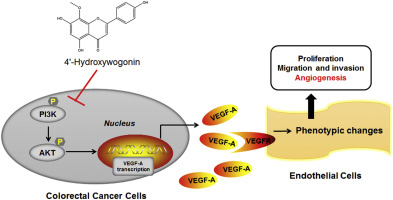Chemico-Biological Interactions ( IF 4.7 ) Pub Date : 2018-09-12 , DOI: 10.1016/j.cbi.2018.09.003 Dongdong Sun , Feng Zhang , Jie Qian , Weixing Shen , Huisen Fan , Jiani Tan , Liu Li , Changliang Xu , Ye Yang , Haibo Cheng

|
Angiogenesis is fundamental for solid tumor growth and metastasis, and anti-angiogenic therapy has been an important therapeutic option for cancer treatment. Colorectal cancer (CRC) represents the fourth leading cause of cancer-related death worldwide. The current studies were aimed at investigating the anti-angiogenic effects of the natural compound 4′-hydroxywogonin (4′-HW) on CRC-related angiogenesis. Human CRC cell line SW620 cells and normal human intestinal epithelial HIEC cells were cultured and treated with interleukin-6 to mimic the tumor inflammatory microenvironment. Our data showed that 4′-HW reduced the viability of SW620 cells in a concentration- and time-dependent manner. 4′-HW also suppressed the proliferation of SW620 cells, but had little effect on the viability of HIEC cells. Moreover, 4′-HW concentration-dependently decreased the mRNA and protein expression of vascular endothelial growth factor-A (VEGF-A), the predominant pro-angiogenic cytokine in tumor angiogenesis. Subsequently, 4′-HW concentration-dependently inhibited the phosphorylation of phosphatidylinositol 3-kinase (PI3K) and AKT. PI3K inhibitor wortmannin, similar to 4′-HW, significantly downregulated the VEGF-A expression in SW620 cells, and combination of wortmannin and 4′-HW produced more significant effects. Finally, human umbilical vein endothelial cells (HUVECs) incubated with the conditioned medium of 4′-HW-treated SW620 cells exhibited impaired angiogenic capacity at Matrigel. Incubation with the neutralizing antibody against VEGF-Aalone also suppressed the angiogenic properties of HUVECs in vitro. Collectively, 4′-HW decreased the viability and reduced angiogenesis in CRC, which was associated with downregulation of VEGF-A expression by disrupting the PI3K/AKT pathway. Our discoveries suggested 4′-HW as a promising anticancer agent against CRC targeting angiogenesis.
中文翻译:

4'-hydroxywogonin通过破坏PI3K / AKT信号传导抑制大肠癌血管生成
血管生成是实体瘤生长和转移的基础,而抗血管生成治疗已成为癌症治疗的重要治疗选择。结直肠癌(CRC)代表了世界范围内与癌症相关的死亡的第四大主要原因。当前的研究旨在研究天然化合物4'-羟基卵黄素(4'-HW)对CRC相关血管生成的抗血管生成作用。培养人CRC细胞系SW620细胞和正常人肠上皮HIEC细胞并用白介素6处理以模拟肿瘤炎性微环境。我们的数据显示4'-HW以浓度和时间依赖性方式降低SW620细胞的活力。4'-HW也抑制SW620细胞的增殖,但对HIEC细胞的活力影响很小。而且,4'-HW浓度依赖性地降低了血管内皮生长因子-A(VEGF-A)的mRNA和蛋白表达,VEGF-A是肿瘤血管生成中主要的促血管生成细胞因子。随后,4'-HW浓度依赖性地抑制磷脂酰肌醇3-激酶(PI3K)和AKT的磷酸化。PI3K抑制剂渥曼青霉素与4'-HW相似,可显着下调SW620细胞中VEGF-A的表达,渥曼青霉素和4'-HW的组合产生更显着的作用。最后,用4'-HW处理的SW620细胞的条件培养基孵育的人脐静脉内皮细胞(HUVEC)在基质胶上显示出血管生成能力受损。与抗VEGF-Alone的中和抗体一起孵育也可抑制HUVEC的血管生成特性 随后,4'-HW浓度依赖性地抑制磷脂酰肌醇3-激酶(PI3K)和AKT的磷酸化。PI3K抑制剂渥曼青霉素与4'-HW相似,可显着下调SW620细胞中VEGF-A的表达,渥曼青霉素和4'-HW的组合产生更显着的作用。最后,用4'-HW处理的SW620细胞的条件培养基孵育的人脐静脉内皮细胞(HUVEC)在基质胶上显示出血管生成能力受损。与抗VEGF-Alone的中和抗体一起孵育也可抑制HUVEC的血管生成特性 随后,4'-HW浓度依赖性地抑制磷脂酰肌醇3-激酶(PI3K)和AKT的磷酸化。PI3K抑制剂渥曼青霉素与4'-HW相似,可显着下调SW620细胞中VEGF-A的表达,渥曼青霉素和4'-HW的组合产生更显着的作用。最后,用4'-HW处理的SW620细胞的条件培养基孵育的人脐静脉内皮细胞(HUVEC)在基质胶上显示出血管生成能力受损。与抗VEGF-Alone的中和抗体一起孵育也可抑制HUVEC的血管生成特性 渥曼青霉素和4'-HW的组合产生了更显着的效果。最后,用4'-HW处理的SW620细胞的条件培养基孵育的人脐静脉内皮细胞(HUVEC)在基质胶上显示出血管生成能力受损。与抗VEGF-Alone的中和抗体一起孵育也可抑制HUVEC的血管生成特性 渥曼青霉素和4'-HW的组合产生了更显着的效果。最后,用4'-HW处理的SW620细胞的条件培养基孵育的人脐静脉内皮细胞(HUVEC)在基质胶上显示出血管生成能力受损。与抗VEGF-Alone的中和抗体一起孵育也可抑制HUVEC的血管生成特性体外。共同地,4'-HW降低了CRC的生存力并减少了血管生成,这与通过破坏PI3K / AKT途径而下调VEGF-A表达有关。我们的发现表明4'-HW是一种有前途的抗CRC靶向血管生成的抗癌药。











































 京公网安备 11010802027423号
京公网安备 11010802027423号